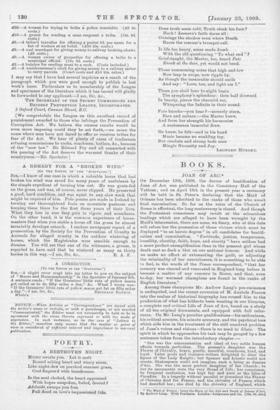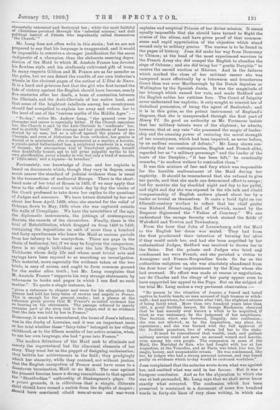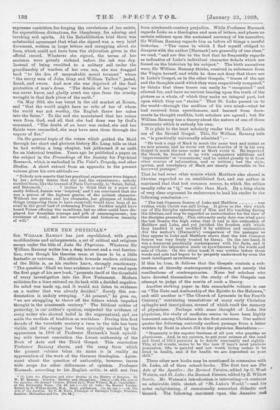BOOKS.
JOAN OF ARC.* ON December 13th, 1908, the decree of beatification of Joan of Arc was published in the Consistory Hall of the Vatican; and on April 18th in the present year a ceremony will be held in St. Peter's declaring that the Maid of Orleans has been admitted to the ranks of those who await tiiml canonisation. So far as the voice of the Church of Rome is effectual, the long controversy is closed. And though the Protestant conscience may revolt at the miraculous healings which are alleged to have been wrought by the
Maid's intercession, there are none, we fancy, who at this date will refuse her the possession of those virtues which must be displayed " to an heroic degree " in all candidates for beatifi-
cation and canonisation. " Fortitude, justice, temperance, humility, chastity, faith, hope, and charity " have seldom had a more perfect exemplification than in the peasant girl whose death cast so dark a blot on our national honour. And while we make no effort at extenuating the guilt, or adjusting the criminality of her executioners, it is something to be able to feel, in the words of the Times correspondent, " that her memory was cleared and venerated in England long before it became a matter of any concern in Rome, and that, even to-day, her warmest champions are found in the ranks of English literature."
Among these champions Mr. Andrew Lang's pre-eminence is undisputed, and the recent excursion of M. Anatole France into the realms of historical biography has roused him to the production of what has hitherto been wanting in our libraries, a complete and critical Life of Joan of Arc, based on a study of all the original documents, and equipped with full refer- ences. On Mr. Lang's peculiar qualifications—his enthusiasm, his critical acumen, his minute accuracy, and the psychical lore which aids him in the treatment of the still unsolved problem of Joan's voices and visions—there is no need to dilate. The spirit in which he approaches his task may be gauged by a few
sentences taken from the introductory chapter :—
" She was the consummation and ideal of two noble human efforts towards perfection, The peasant's daughter was the Flower of Chivalry, brave, gentle, merciful, courteous, kind, and loyal. Later, poets and romance-writers delighted to draw the figure of the Lady Knight ; but Spenser and Ariosto could not create, Shakespeare could not imagine, such a being as Jeanne d'Are. She was the most perfect daughter of her Church ; to her its sacraments, were the very Broad of Lifo ; her conscience, by frequent confession, was kept fair and pure as the lilies of Paradise. In a tragedy without parallel or precedent the Flower of Chivalry died for France, and time chivalry of Franco, which had deserted her; she died by the chivalry of England, which
" The Maid of France: being the Story of OA Life and Death of .Teanne d'Aro.
By Andrew Lang. With Portraits. London: Longman and Co. [12s. OIL dot.]
shamefully entreated and • destroyed her ; while the most faithful of Christians perished through the celestial science,' and dull political hatred of Priests who impudently called themselves 'the Church.'
Mr. Lang does not often write in this strain; but we are not prepared to say that his language is exaggerated, and it would be impossible to conceive a stronger justification for the caena indignatio of a champion than the elaborate sneering depre- ciation of the Maid to which M. Anatole France has devoted his flawless style and his studiously cultivated gift of irony. In many respects Gibbon and M. France are, as far asunder as the poles, but we can detect the rumble of our own historian's wheels in the choicest pages of the author of L'.gtui de Nacre. It is a hard and grievous fact that the girl who first turned the tide of victory against the English should have become, nearly five centuries after her death, a bone of contention between the Clericals and the Anti-Clericals of her native land, and that some of the brightest intellects among her countrymen should feel compelled to explain her away and reduce her to the level of one of the "curious myths of the Middle Ages " :— " To-day," writes Mr. Andrew Lang, " the quarrel over her character and career is especially bitter. If the Church canonises her, the Church is said by the Anti-Clericals to confiscate' her, and to stultify itself, Her courage and her goodness of heart are denied by no man, but as a set-off against the praises of the Clericals, and even of historians far from orthodox, her genius is deuied or is minimised ; she is represented as a martyr, a heroine, a puzzle-pated hallucinated lass, a perplexed wanderer in a realm of dreams ; the unconscious tool of fraudulent priests, herself once doubtfully honest, apt to tell great palpable myths to her own glorification, never a leader in war, but only a kind of mascotte, a 'little saint; and a beguine—in brooches."
Fortunately, our knowledge of Joan and her exploits is based on documents which, though they vary in degree, come much nearer the standard of judicial evidence than is usual in the transactions of mediaeval Europe. There is the short- hand note of her trial at Rouen in 1431; if we may apply that term to the official record in which day by day the clerks of the Court professed to take down her replies to the questions of Judges and assessors. We have letters dictated by her and about her from April, 1429, when she started for the relief of Orleans, down to May, 1430, when she was captured outside the walls of Compiegne. We have the newsletters of the age, the diplomatic instruments, the jottings of contemporary diarists, the records of the chroniclers. Finally, there is the trial of Rehabilitation, which dragged on from 1450 to 1456, containing the depositions on oath of more than a hundred and forty eyewitnesses who knew the Maid at various periods from her infancy to her martyrdom. There are gape iu the chain of testimony, but, if we may be forgiven the comparison, there is no single individual save the late Roger Charles Tichborne whose daily life and whose most trivial acts and sayings have been exposed to so searching an investigation. This material, more especially the evidence taken at the two trials, is easy of access, and ought to form common ground for the seeker after truth ; but Mr. Lang complains that 11. Anatole France " supports his very strange statements by references to books and pages in which I can find no such matter." To quote a single instance, he "gives a reference to chapter and verse for his allegation that Jeanne had told her fairy-tales of crowns and angels in France. This is enough for the general reader ; but a glance at the reference given proves that M. France's so-called evidence has no bearing on his statements. The passage referred to merely contains part of the story told to the judges, and is no evidence that the tale was told by her in France."
boutretny, it must be remembered, the home of Joan's infancy, was in the duchy of Lorraine, and it was an important issue at her trial whether these "fairy-tales" belonged to her village childhood, or to the fifteen months'of her active mission, when, to use her own language, she had "gone into France."
The modern detractors of the Maid seek to eliminate not merely the supernatural but the abnormal elements of her story. They treat her as the puppet of designing eoclesiastics; they belittle her achievements in the field ; they grudgingly admit her sincerity, while they contend, not without justice, that the English occupation of France must have come to a disastrous termination, Maid or no Maid. The case against the peasant heroine bears a strong resemblance to that against the " Stratfordian" authorship of Shakespeare's plays. On a priori grounds, it is ridiculous that a simple, illiterate Child should have roused a nation from the depths of despair; should have oonvinced ribald men-at-arms and war-worn
captains and sceptical Princes of her divine mission It seems equally impossible that she should have turned to flight the armies of the aliens, and have given proof of that common- sense and rapid appreciation of the objective which stand second only to military genius. The answer is to be found in the pages of history. Joan did make her way from Domremy to Chinon; at the head of the most experienced warriors in the French Army she did compel the English to abandon the siege of Orleans ; and she did bring her " gentle Dauphin " to receive the sacred unction at Rheims. Aud in the failures which marked the close of her militant career she was hampered more effectually by a lukewarm and treacherous Court than was ever Marlborough by the Dutch deputies or Wellington by the Spanish Junta. It was the magnitude of her triumph which caused her ruin, and made Bedford and the English nobles her ruthless foes. The Court of Iniquity never underrated her exploits ; it only sought to convict her of diabolical possession, of being the agent of Beelzebub ; and it is in this guise, as the potent instrument of England's disgrace, that she is masqueraded through the first part of Henry VI. So good an authority as Mr. Fortescue insists that her military talents were of the slightest he admits, however, that at any rate "she possessed the magic of leader- ship and the amazing power of restoring the moral strength of her countrymen, which had been impaired, as never before, by an endless succession of defeats." Mr. Lang shows con-. elusively that her contemporaries, English and French alike, regarded her as "a military personage" and the leader of the hosts of the Dauphin ; " it has been left," he caustically remarks, " to modern writers to contradict them."
It was this mixture of fear and fury which was responsible for the horrible maltreatment of the Maid during her captivity. It should be remembered that she refused to give her parole, and that she made one determined effort to escape; but for months she lay shackled night and day to her and night and day she was exposed to the vile talk and ribald companionship of English archers placed about her by a leader as brutal as themselves, It casts a lurid light on our fifteenth-century warfare to reflect that her chief gaoler was Richard Beauchamp, Earl of Warwick, named by the Emperor Sigismuud the " Father of Courtesy." We can understand the savage ferocity which stained the fields of Wakefield and Towton and Tewkesbury.
From the hour that John of Luxembourg sold the Maid
to the English her doom was sealed, They had from the first proclaimed their intention of burning her alive if they could catch her, and had she been acquitted by her ecclesiastical Judges, Bedford was resolved to drown her in' the Seine. But the priests and Judges who tried ana condemned her were French, and she perished a victim to Armagnac and Franco-Burgundiau feuds. So far as the authorities enlighten us, she was absolutely abandoned from the first hour of her imprisonment by the King whom she had crowned. No effort was made at rescue or negotiation, nor do Charles and the clergy of her party appear even to have supported her appeal to the Pope. But on the subject of• her trial Mr. Lang makes a very pertinent observation :- "No person in the' situation of Joanne, a feared and hated captive in hostile hands, no man accused of high treason or witch- craft—had anywhere, for centuries after 1431, the slightest chance of being fairly tried. More than two hundred years later than 1431, a groat Scottish lawyer, Sir George Mackenzie, observed that be had scarcely over known a witch to be acquitted, if tried, as was customary, by the judgment of her neighbours. The Scottish witch was tortured, illegally, into confession ;. she was not allowed, as by the Inquisition, any place for repentance ; and she was burned with the full approval of the Scottish preachers, two of whom led her to the stake. It must be remembered that wealth, rank, and gallant military service could not save an accused wizard and heretic, oven among his own people. The companion in arms of the Maid, the Marechal do Rais, who had fought with her at Los Augustine, at the Tourelles, and at Paris, was tried, liko her, for magic, heroey, and unspeakable crimes. He was condemned, liko her, by judges who had a strong personal interest, and was found guilty on evidence which to-day would be reckoned worthless." Joan complained that the notaries wrote down what was against her, and omitted what was said in her favour. But it was a foregone conclusion. And as for the abjuration to which she was at last persuaded, Mr. Lang says that we shall never know exactly what occurred. The confession which has been preserved is contained in a document of some five hundred
she words in forty-six lines of very close writing, in which
expresses contrition for forging the revelations of her saints, for superstitious divination, for blasphemy, for adoring and invoking evil spirits. At the Rehabilitation trial there was substantial agreement that what she signed was a very brief document, written in large letters and occupying about six lines, which could not have been the abjuration given in the official record. Whatever she signed, the terms of her sentence were grossly violated before the ink was dry. Instead of being remitted to a solitary cell under the guardianship of warders of her own sex, she was dragged back " to the den of unspeakable moral torment" where " the merry men of John Gray and William Talbot" jested, drank, and swore. And now she was deprived of the frail protection of man's dress. "The details of her ' relapse ' we can never know, and gladly avert our eyes from the cruelty wrought in that dark place of the earth."
On May 30th she was burnt in the old market at Rouen, and "that the world might have no relic of her of whom the world was not worthy, the English threw her ashes into the Seine." To the end she maintained that her voices were from God, and all that she had done was by God's command. "The doubt of an hour was ended, she and her Saints were reconciled, she may have seen them through the vapour of fire."
On the general topic of the voices which guided the Maid through her short and glorious history Mr. Lang tells us that he had written a long chapter, but jettisoned it as unfit for an historical treatise. Years ago be published a paper on the subject in the Proceedings of the Society for Psychical Research, which is embodied in The Valet's Tragedy, and other Studies. A short extract from an appendix to the present volume gives his own attitude:— "Nobody now asserts that her psychical experiences were feigned by her ; nobody denies that she had the experiences ; nobody ascribes them, like the learned of Paris University, to Satan, Belial,
and Behemoth.' I incline to think that in a sense not easily defined, Jeanne was inspired,' and I am convinced that she was a person of the highest genius, of the noblest character. Without her genius and her character, her glimpses of hidden things (supposing them to have occurred) would have been of no avail in the great task of redeeming France. Another might have heard Voices offering the monitions, but no other could have dis- played her dauntless courage and gift of encouragement ; her sweetness of soul ; and her marvellous and victorious tenacity of will."








































 Previous page
Previous page